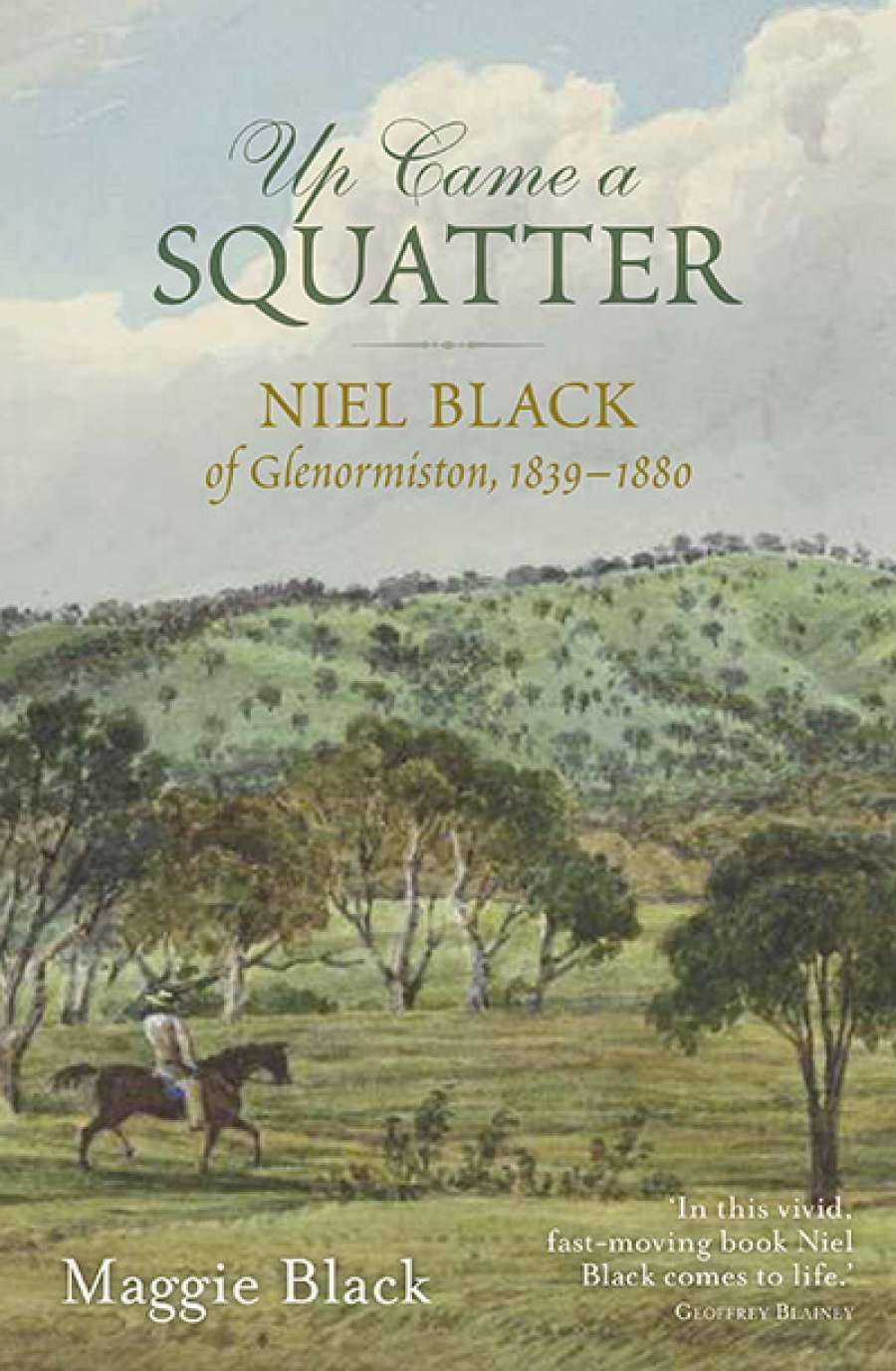
- Free Article: No
- Contents Category: Biography
- Custom Article Title: John Arnold reviews 'Up Came a Squatter: Niel Black of Glenormiston, 1839–1880' by Maggie Black
- Custom Highlight Text:
At the launch of Up Came a Squatter, Geoffrey Blainey reflected on how important the wool industry was to Australia for more than a hundred years ...
- Book 1 Title: Up Came a Squatter
- Book 1 Subtitle: Niel Black of Glenormiston, 1839–1880
- Book 1 Biblio: NewSouth $49.99 pb, 328 pp, 9781742235066
Black wrote a detailed letter home virtually every week to his partner and mentor, Thomas Gladstone, reporting on his activities and progress. He kept copies, and his letterbooks comprise more than a million words. They were in danger of being pulped during World War II due to government requisitioning of waste paper, but Hope Black, the widow of one of Niel Black’s grandsons, hid them in the loft of the family stables. They were discovered in the 1950s by Margaret Kiddle during her research for her posthumously (and acclaimed) Men of Yesterday: A social history of the Western District (1961).
It is these letters, now housed in the State Library Victoria, that Maggie Black has used to write a biography of her great-grandfather. Although a descendant of her subject, this is no hagiography nor a ‘names and dates’ family history. Black is an experienced author having published histories of Oxfam and UNICEF plus several books on water sanitation. In Up Came a Squatter she presents a sympathetic but not uncritical portrait of Niel Black.
Besides looking after and developing the partners’ pastoral runs, Black’s other main concern for much of his adult life was finding a suitable wife. He came to Australia as a bachelor and returned to the British Isles twice to find a partner. The second visit, in the 1850s, was successful, but he was away for seven years. During this time, the business was left in the hands of Black’s young nephew, Archie Black. Somewhat reckless and mentally unstable, Archie resisted direction from his uncle and borrowed money to buy large tracts of their land.
Black returned to Australia with his new bride late in 1857. He had already purchased a substantial home in Scotland and the plan was to stay only for a short period while he tidied up what he considered to be young Archie’s mess. But he stayed on, one of the reasons being the Selection Acts. These were aimed at opening up the leased pastoral lands in the vain hope of creating an Australian yeomanry of small farmers. Archie’s previous purchases had probably protected the runs from being broken up completely when the acts were introduced. Black, however, was forced to participate in dummying and using dubious agents and middle-men to buy key lots of land on his behalf. These actions, forced on him as the only way he could guarantee the retention of his holdings and their improvements, disgusted him. He wrote home in one of his many letters that ‘we are full of corruption from head to foot’.
 Niel Black in Scottish Regalia, ca 1850s (Museum Victoria Collections)Grace Black, his much younger wife, in addition to bearing him three sons, was a tower of strength to her husband. Their home at Glenormiston and later at Mt Noorat became social centres for the district, hosting dances and entertaining visitors, including Prince Alfred in 1867. Queen Victoria’s son, however, was more interested in hunting than playing the role of a visiting royal dignitary.
Niel Black in Scottish Regalia, ca 1850s (Museum Victoria Collections)Grace Black, his much younger wife, in addition to bearing him three sons, was a tower of strength to her husband. Their home at Glenormiston and later at Mt Noorat became social centres for the district, hosting dances and entertaining visitors, including Prince Alfred in 1867. Queen Victoria’s son, however, was more interested in hunting than playing the role of a visiting royal dignitary.
Conservative in his views, Black was a member of both the Melbourne Club and the Victorian Legislative Council for many years, as well as being patron or president of numerous local organisations. He died in 1880, aged seventy-five. His funeral cortège was nearly a mile long and consisted of over sixty vehicles, plus numerous people on horses or on foot from all over the Western District.
Niel Black may have been opposed to what he called ‘the wild torrent of democracy’ but, as this admirable and well-written biography shows, he was a man of principle who developed rather than exploited the land as well as being a benevolent employer. He deserves to be remembered as a nineteenth-century landed capitalist who left lasting benefits to his adopted country, in his case Victoria and its Western District.


Comments powered by CComment